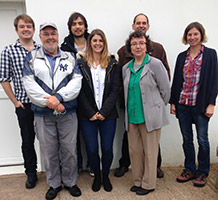articles

The picture shows students George Keyworth-Wright and Sam Jones with Alan Shuttleworth (NLO) and Suzy Bingham (Met Office) in the back row, and Iain Grant (Norman Lockyer Observatory), Sophie Gossage (student), Lee-Anne McKinnell (South African National Space Agency) at the front.
Exeter student project to monitor space weather events
University of Exeter students are leading a project with the Met Office, British Geological Survey and Lancaster University to better understand space weather events and the prediction of their impacts.
Space Weather is caused by large eruptions on the Sun which can have a dramatic impact on technology including communications, energy supply and satellite operations as well as affecting radiation levels and exposure.
Based at the historic Normal Lockyer Observatory in Sidmouth, the third year students of Natural Sciences are working with Dr Suzy Bingham from the Met Office, and supported by Dr Sharon Strawbridge at the University, to install an instrument that will measure the strength and direction of the Earth’s magnetic field. The students are also working closely with British Geological Survey and Lancaster University who developed the instrument. The findings from this will be used to monitor space weather and enhance the ability to understand and predict space weather events.
Professor Geoff Nash, Director of Natural Sciences from the University of Exeter, said: “This fantastic project is an opportunity for our students to help influence the prediction of space weather events and their effects, harnessing the expertise of the Met Office and demonstrating the benefits interdisciplinary working has for modern research into this field.
“The project also highlights the potential of our undergraduates to contribute to this type of research”.
Severe space weather is recognised as having potentially significant impact on the UK's critical national infrastructure and forecasts are of importance to the Armed Forces, electricity industry, satellite operators and the aviation industry.
Dr Suzy Bingham from the Met Office, said: “Working with a group of such talented students from the University has been a real pleasure and it has been great to see the motivation demonstrated by the students in helping us to better understand this natural and disruptive phenomena.”
Students working on the project have also been lucky enough to interview Dr Lee-Anne McKinnell, Managing Director of the South African National Space Agency (SANSA) on a recent visit to the Met Office and have had their project accepted as part of the programme at the 2015 European Space Weather Conference to be held in Belgium later this month.
Natural Sciences at Exeter is an innovative flagship programme designed to explore the scientific concepts needed to explain the natural world, from the nanoscale to the complex systems of the Earth’s climate and our solar system. Other group projects this year are being run with support from Dr Peter Fallon, also at the Met Office, and Dr John Chilton of the University Medical School.
The University is part of the Met Office Academic Partnership which launched in 2010. The partnership aims to advance the science and skill of weather and climate prediction, provide society with the best possible advice, and provide an outstanding environment in which to develop the science leaders of tomorrow.
Date: 13 November 2015
